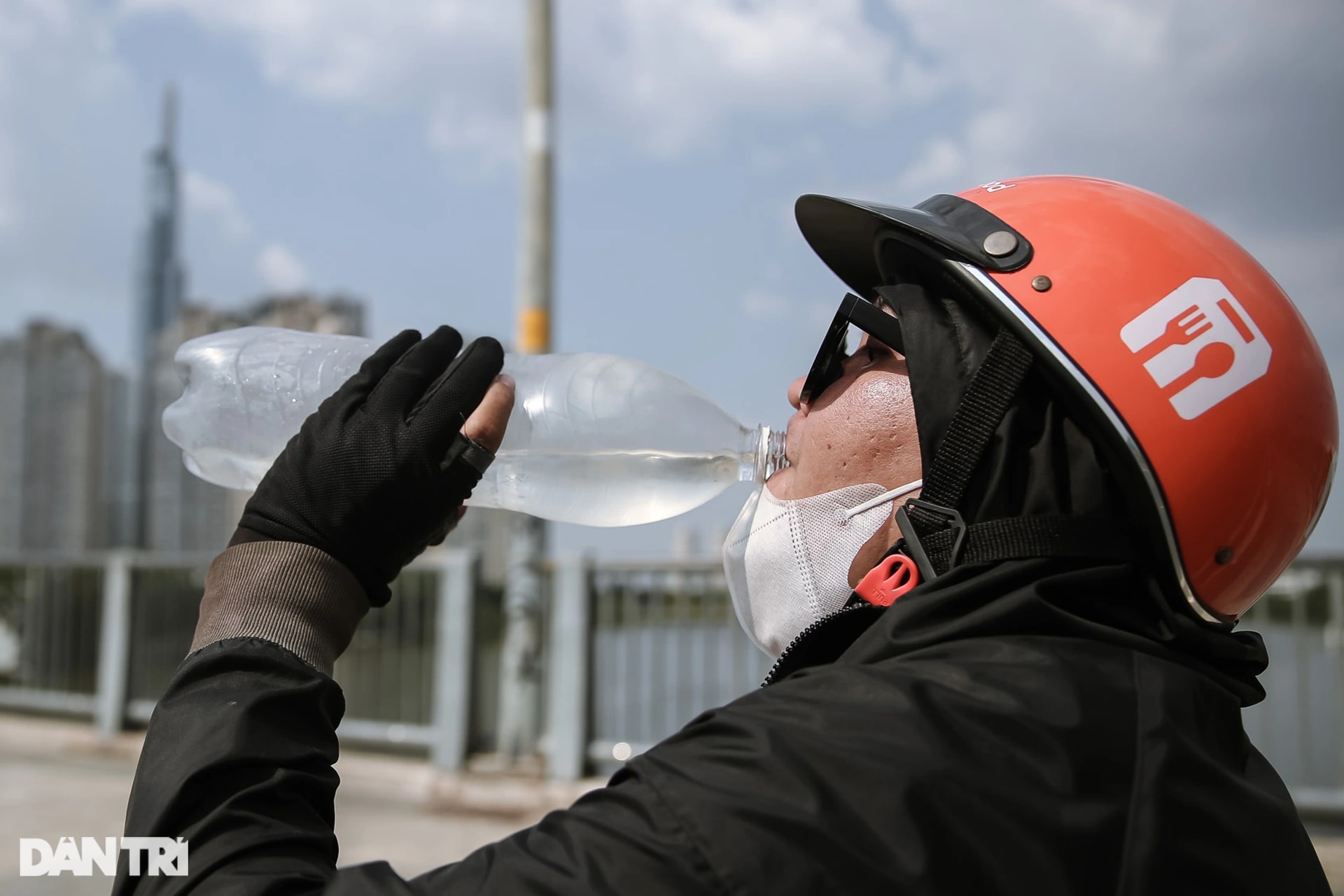Tips for quick rehydration on hot days
If you feel dry or tired after exercise or anytime during normal daily activities especially on hot days, chances are you are dehydrated.
Not rehydrating quickly can have serious consequences for your mental and physical health. That's why rehydrating quickly can help you get back on track.
How much water do you need in a day?
It is a common misconception that you should drink eight glasses of water a day. The truth is that fluid recommendations vary depending on age, activity level, weight, sweat rate, and living conditions. However, the body is about 60% water, and the body constantly loses water through urine, sweat, and breathing.
That is why hydration is an essential part of human life. But figuring out how much water an individual needs is not always simple.

Rehydration on hot days plays a very important role. Illustration: Huy
According toTodayThe National Academy of Medicine states that adequate daily water intake is 9 cups for women and 13 cups for men. This amount is designed to prevent dehydration in the short term, but some people may need more water, especially if they sweat a lot or live in hot and humid conditions.
Additionally, the agency recommends consuming about 20% of fluid intake through foods, such as fruits and vegetables.
Symptoms of dehydration
Dehydration happens to everyone, even those who closely follow the recommended water intake guidelines. It is especially common after intense exercise or prolonged time in hot or humid environments. Dehydration can also occur if you forget to drink enough water during the day.
Dehydration can sneak up on you and the symptoms can range from mild and uncomfortable to severe and life-threatening. Here are some signs of dehydration to look out for:
- Tired.
- Thirsty.
- Dry skin and lips.
- Dark urine or reduced urine output.
- Headache.
- Muscle cramps.
- Dizzy.
- Dizzy.
- Faint.
- Orthostatic hypotension (drop in blood pressure when moving from sitting to standing).
- Heart palpitations.
If you frequently experience one or more of these symptoms during or after exercise or at a particular time of day, chances are you're not drinking enough water and need to rehydrate.
How to rehydrate quickly
Most hydration guidelines are geared toward athletes, but they can also apply to the average person. The International Society of Sports Nutrition (ISSN) states that post-exercise goals should include replacing fluids and electrolytes lost through sweat. Here are some tips for effective rehydration.
Weigh yourself before exercising
According to ISSN, weighing yourself before and after exercise can help you see how much fluid you've lost. You may need to drink up to three cups of water for every pound you lose during exercise.
Add more electrolytes
You should include electrolytes in your hydration plan to prevent severe dehydration (loss of more than 2% of body weight during exercise). The body loses electrolytes such as sodium, magnesium, potassium, and calcium through sweat. Replacing these electrolytes is important to help the body maintain a normal fluid balance inside and outside the cells.
Additionally, electrolytes help your body absorb water quickly. There are no standard guidelines for when to take electrolytes, but a good rule of thumb is to rehydrate with electrolytes after a workout that lasts longer than 60 minutes, a particularly intense workout (like HIIT or sprinting), or spending a long time in hot, humid conditions.
Monitor your urine color
Mild dehydration can also occur when exercising for less than 60 minutes or when you are in a hot environment. In these cases, sipping water until your urine volume and color return to normal is a good rehydration strategy.
Sip water, don't gulp it down.
Don't drink water too quickly, as this can cause your body to become dehydrated, a dangerous condition called hyponatremia. Also, drinking too much at once can make you feel nauseous. Instead, drink water steadily over the course of one to two hours after you've lost fluids.
Eat fruits and vegetables
Don't forget to eat water-rich foods, especially fruits and vegetables, which can aid in rehydration.
The fastest way to cure dehydration
If you are concerned that you are severely dehydrated, you should seek medical attention as this can be a medical emergency and you may need treatment with intravenous fluids.
However, if you're just trying to rehydrate effectively and don't have symptoms of severe dehydration, the fastest option is to sip water every one to two hours or until you're no longer dehydrated.
Adding electrolyte supplements or other oral hydration solutions can also help you treat dehydration more quickly.
How do you know you're getting enough water?
Once you have rehydrated, your urine will return to a pale yellow color. Your weight will also return to normal. It may take some time, but other symptoms such as headaches or fatigue will improve.
It is best to avoid situations that require you to rehydrate, so drink water while exercising to avoid dehydration.
Tips for practicingsafe exercise in hot weather

Associate Professor, Dr. Vo Tuong Kha, Vietnam Sports Hospital, Head of Sports Medicine Department, University of Medicine and Pharmacy, Vietnam National University, Hanoi. Photo: NP
Associate Professor, Dr. Vo Tuong Kha, Vietnam Sports Hospital, Head of the Department of Sports Medicine, University of Medicine and Pharmacy, Vietnam National University, Hanoi, said that when exercising in hot conditions, especially in the summer, to ensure safety, we must pay attention to the following:
Firstly, about the time of exercise, we should exercise early in the morning or late afternoon to reduce the heat radiation from the environment accumulating in the body, helping to limit increased body temperature and limit the impact of ultraviolet rays on the body.
Second, exercise in a well-ventilated, low-humidity, well-ventilated place that allows water to evaporate easily, helping you sweat quickly.
Third, you must choose suitable tools and clothes. If outdoors, you must have a hat and loose, airy, sweat-wicking, light-colored clothes.
Fourth, sunscreen should be applied to exposed areas of the body to avoid UV rays and sunlight from affecting the skin.
5th, prepare enough sweat towels to absorb sweat.
Friday, prepare drinking water with full electrolytes to replenish the amount of water lost through sweat, prepare a little energy in the form of solution to compensate for the energy lost during physical activity. You can use ready-made bottled oresol, boxed milk, salt water mixed with sugar in appropriate proportions.
Saturday, make sure to adjust the amount of exercise to match the time of exercise, avoid prolonged, overexerting activity under the sun, which leads to heat generation and high energy consumption.
Before, during and after long training and competition in hot weather, it is necessary to pay attention to rehydration regularly, continuously every 20-30 minutes, no more than 200ml at a time. Water must have full electrolytes such as oresol, to replenish energy lost during energy consumption due to training.



